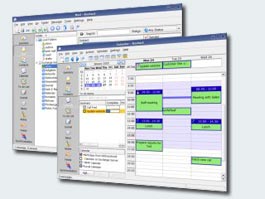Kontact/pl: Difference between revisions
Created page with "== Używanie Kontact we współpracy z MyKolab.com ==" |
Created page with "* Dodawanie konta MyKolab.com" |
||
| Line 63: | Line 63: | ||
[https://kolab.org Kolab.org] is a Free Software Groupware solution closely connected to KDE. The following page describes how to set up a [https://mykolab.com MyKolab] account with Kontact, but it works with any other Kolab Server as well. | [https://kolab.org Kolab.org] is a Free Software Groupware solution closely connected to KDE. The following page describes how to set up a [https://mykolab.com MyKolab] account with Kontact, but it works with any other Kolab Server as well. | ||
* [[Special:myLanguage/Working_with_MyKolab| | * [[Special:myLanguage/Working_with_MyKolab|Dodawanie konta MyKolab.com]] | ||
== Using Kontact with GMail and Google Data == | == Using Kontact with GMail and Google Data == | ||
Revision as of 21:33, 28 May 2015
 |
Kontact jest zintegrowanym osobistym menadżerem informacji w KDE, ale może być także używany w innych systemach.
Oferuje pocztę e-mail, książkę adresową, kalendarz, listę zadań i o wiele więcej. |
Zespół Kontact gromadzi pod swoim dachem dojrzałe i sprawdzone użytki organizacyjne KDE. Dzięki sprawności technologii KPart istniejące użytki zespoliły się bezpośrednio w jeden.
Dokumentacja dla programu Kontact jest dostępna tutaj.
Skąd wziąć Kontact?
Od kiedy Kontact jest pisany w przenośnej technologii Qt jest dostępny na wielu różnych systemach operacyjnych:
GNU/Linux
Kontact jest dostępny na wszystkich głównych dystrybucjach GNU/Linux. Użyj menadżera pakietów lub centrum oprogramowania w swojej dystrybucji, aby zainstalować Kontact.
Windows
Utrzymanie programu Kontact dla systemu Windows jest obecnie sponsorowane przez Kolab Systems, który udostępnia instalator tutaj.
Składniki
KDE Kontact wspiera różne serwery do pracy grupowej. Używając tych serwerów Twoi współpracownicy mają dostęp do wspólnej poczty, list z zadaniami grupowymi, wspólnego kalendarza, centralnej książki adresowej oraz harmonogramu spotkań.
Składniki użytku Kontact są dostosowane do wzajemnej współpracy. Dzięki temu wykazuje on takie cechy jak narzucający się mechanizm przenoszenia i upuszczania pomiędzy organizacją spotkań, zadaniami i kontaktami. Użytek Kontact obsługuje różne wymienniki pracy grupowej. Dzięki użyciu tych wymienników Wasza grupa robocza ma dostęp do takich cech jak wspólne przegródki pocztowe, grupowe spisy zadań, wspólne kalendarze, zakładowe spisy adresów i wyznaczanie spotkań.
Kontact składa się z następujących programów
- Akregator - Odczytuj swoje ulubione kanały informacji
- KAddressBook - Zarządzaj swoimi kontaktami
- KJots - Twoje pomysły zorganizowane w jednym notatniku
- KMail - Klient poczty e-mail
- KNode - Czytnik grup dyskusyjnych
- KNotes - Karteczki na pulpicie
- KOrganizer - Kalendarz i przypomnienia, dziennik
- KTimeTracker - Śledź ile czasu spędzasz nad określonymi zadaniami
- Summary - Ekran podsumowania spraw zarządzanych przez Kontact
Zobacz także
- Jak wysyłać SMSy używając Kontact
- Port na urządzenia dotykowe (takie jak telefony komórkowe lub tablety)
Używanie Kontact we współpracy z MyKolab.com
Kolab.org is a Free Software Groupware solution closely connected to KDE. The following page describes how to set up a MyKolab account with Kontact, but it works with any other Kolab Server as well.
Using Kontact with GMail and Google Data
- Working with GMail - Read your GMail in KMail
- Working with Google Calendar - Integrate Google Calendar with KOrganizer.
- Working with Google Contacts - Allow Google Contacts to synchronize with Kontact
Where to get help
There is a mailing list at
- kdepim-users - for users of the KDE PIM applications (Kontact, KAddressBook, KMail, KOrganizer, KNode, ...) subscribe to kdepim-users archive of kdepim-users. A team of developers and users aim to give answers as quickly as possible
and for urgent help, an IRC channel on Freenode
- for users and developers of Kontact - #kontact
Akonadi and KAddressBook
If you have problems concerning Akonadi and the new KAddressBook, there are pages dedicated to these issues
FAQ, Hints and Tips
Migrating your setup to a new distro
In KMail, right click on your Inbox and choose Properties. Go the Maintenance Tab. Have a look at the Location. It has either .kde4 or .kde in the path.
Substitute the appropriate path below.
You need the following config files:
- .kde4/share/config/emaildefaults
- .kde4/share/config/emailidentities
- .kde4/share/config/kmail.eventsrc
- .kde4/share/config/kmailrc
- .kde4/share/config/kaddressbookrc
- .kde4/share/config/kresources/contact
- .kde4/share/config/korgacrc
- .kde4/share/config/korganizerrc
- .kde4/share/config/knotesrc
- .kde4/share/config/mailtransports
And the following directories:
- .kde4/share/apps/kmail
- .kde4/share/apps/kabc
- .kde4/share/apps/korganizer
- .kde4/share/apps/knotes
If you use Akregator within Kontact, you will also need:
- .kde4/share/config/akregator.eventsrc
- .kde4/share/config/akregatorrc
And the whole .kde4/share/apps/akregator directory.
Of course the simplest way is just to keep your whole home directory.
Just a word of warning. If the directory naming is different between Desktops or between the two versions of your distro, this will not work as there are references to the directories within the config files. This means that if the files were in a .kde directory, you cannot just put them in a .kde4 directory without editing the references within the config files.
Hiding the Kontact Sidebar
On small screens, you may wish to reclaim the space used by the Kontact sidebar. You can replace it with an (editable) toolbar:
- Drag the left panel closed using the splitter between it and the main panel, job done. Don't forget to enable Navigator in every component.
Enabling SOCKS support in KMail and KNode
Unlike KDE 3, KDE 4 does not have built-in SOCKS support yet. However, it is still possible and relatively simple to make KMail and KNode use a SOCKS proxy, by using proxychains or other similar tools like tsocks or socksify. Assuming that proxychains is correctly installed and configured, all you need to do is to open a terminal (e.g. Konsole) and type:
proxychains kdeinit4
You don't even need to restart KMail/KNode! (You need to type the above command every time you start a new KDE session though).
Integrate the KDE-Telepathy VoIP module into Kontact / KAddressBook
See the Telepathy page.
